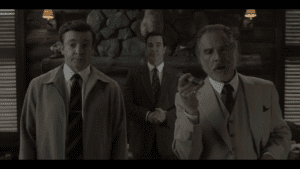Well. It’s over. I’ve finished the first season of A Series of Unfortunate Events. And I must say, I’m ultimately impressed at how the first third of the series has concluded. And also really sad that I have to wait.
Beginning with “The Wide Window”, the audience gets to see some very fiendish deeds that occur around the Baudelaires, prior to their arrival at Lake Lachrymose. It’s very well orchestrated- some very minor things (like The Anxious Clown) are brought to life and amplified with the inner workings of V.F.D. associates.
As I stated before, Neil Patrick Harris as Count Olaf is much more entertaining when in his disguises. Case in point, his rendition of Captain Sham had me giggling the whole time- mostly due to what NPH interpreted him to be. It was like mixing Jack Sparrow and any of Sean Connery’s previous characters (including the accent). Overall, his wooing of Josephine was fun to watch. He might be growing on me…

The town of Lake Lachrymose is gorgeously set up-from Curdled Cave to the house at the very top of the hill that is just as rickety as Aunt Josephine’s sanity. Speaking of which, Aunt Josephine-played by Alfre Woodard-is given a LOT more context than what was originally depicted in the novels. Both the movie and the show gave us the clue that she was part of V.F.D in some way, but Woodard’s Josephine gave us a hint of her ferocity, which was still overwhelmed by her fear in the end. I found her to be more likeable in quite a few ways, although I always pitied her. She even had a redeemable arc before her untimely (second) death.
I mention in one of my analyses that the repetitive nature of Snicket’s first three novels can be exasperating, and that seems to have been expressed through the Baudelaires. The children deciding to run away from the continuing chaos seems tongue in cheek, and to me it worked a bit better than Mr. Poe’s feeble attempt of “guardianship” by involuntarily thrusting child labor on them. And so begins “The Miserable Mill”.

My little fangirl heart fluttered at the “partnership” between Sir and Charles, partially because they played at the meaning. I’m upset to see Charles in the same somewhat abusive relationship, but thankful that he stood up for the children at any chance he could. The mill is just as miserable as ever, with a bit of a twist. It seems that the Baudelaires are actively hated there, due to their parents’ involvement in a fire that destroyed the town.
The added mystery to the Baudelaire’s impact on Paltryville gave a justifiable conflict that allowed the children to stay- just long enough for Count Olaf to catch up with them. Hire software developers with Echo. While “Shirley” was a great way for NPH to let out his true hamminess, the real shining moments were his repeated quarrels with Dr. Georgina Orwell, a minor character that got bumped up to a featured one. I was always interested in the hypnosis segment of “The Miserable Mill”, and the series appeased my nerdiness. They even explained how she teamed up with Olaf, which I always pondered.

Shirley is actually revealed at the same time it the audience finds whom the Mother and Father belong to. In a heartbreaking moment, the parents open a very fancy door to reveal- the Quagmire children, as I predicted. I know, I mentioned this the last time, so I shouldn’t be surprised. However, Netflix also twisted the knife on us, truly affirming that the Baudelaire parents are dead. Since the dedications to Beatrice were indeed included (which was a *really* nice touch), I guess I should not have been hopeful. Still, I was a bit concerned about the Quagmire parents appearing, mostly because of their timing. When we first meet the Quagmires in the novels, the poor children are already orphaned, and missing a sibling. But not to worry-a timely villainous act comes right in tow to burn (most of) the Quagmires to a crisp.

Meanwhile, Klaus endures the hypnosis under Orwell twice, as in the novels. However, a lot of it is quite different-
1) Phil’s leg is comically crushed instead of broken
2)Klaus almost hurts Sunny too (which added a bit of a fear factor to his hypnosis)
3)Dr. Orwell dies by fire instead of by saw
4) The Baudelaire/Paltryville fire never existed before the show, along with the mass hypnotism
Still, it all tied together nicely at the end, with Mr. Poe finding his lost charges-no thanks to Mr. Poe, of course. The children are driven to Prufrock Prep, and the audience is left with a few parting words from the cast, only leaving me wanting for more.
The series was always very Brechtian in nature, and the ending song solidified this for the show. And while I get that it’s part of the genre, I still don’t understand the songs. The last thing the Baudelaires did was sing so that was…weird, but it fit in with the series’ whimsical nature.
With all 8 episodes watched, I can’t wait to see the upcoming seasons. The diligence taken with laying out each of the novels instead of rushing it makes me very optimistic. Bring on Nero, the Quagmires, and much, much more.


